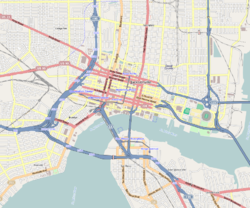 | |
| Established | 1982 |
|---|---|
| Location | Jacksonville, Florida |
| Coordinates | 30°19′30″N81°39′02″W / 30.32500°N 81.65056°W |
| Visitors | 12,677 |
| Director | Wyatt Taylor |
| Public transit access | Bus: Talleyrand Shuttle |
| Website | www |
The Jacksonville Fire Museum is part of the Jacksonville Fire and Rescue Department's Fire Prevention Division. The museum is home to artifacts detailing the history of the fire service not only in Jacksonville, but the entire state of Florida. Exhibits include photos from and a diorama of the Great Fire of 1901, a fully restored 1902 LaFrance horse-drawn fire engine, and a 1926 American LaFrance fire engine.
Contents
The Catherine Street Fire Station, also known as Station 3, is home to the Jacksonville Fire Museum. It is listed on the National Register of Historic Places and has been designated as an official landmark of the City of Jacksonville. Having initially been home to an African-American company of firefighters, the building is also part of Florida's Black Heritage Trail and is registered with the Northeast Florida African-American Historical Society. The station was located at 12 Catherine Street for nearly a century before being moved in 1994 to its current home adjacent to Metropolitan Park.
The museum is currently closed pending the outcome of a planned multi-use development that would utilize its land. [1]




